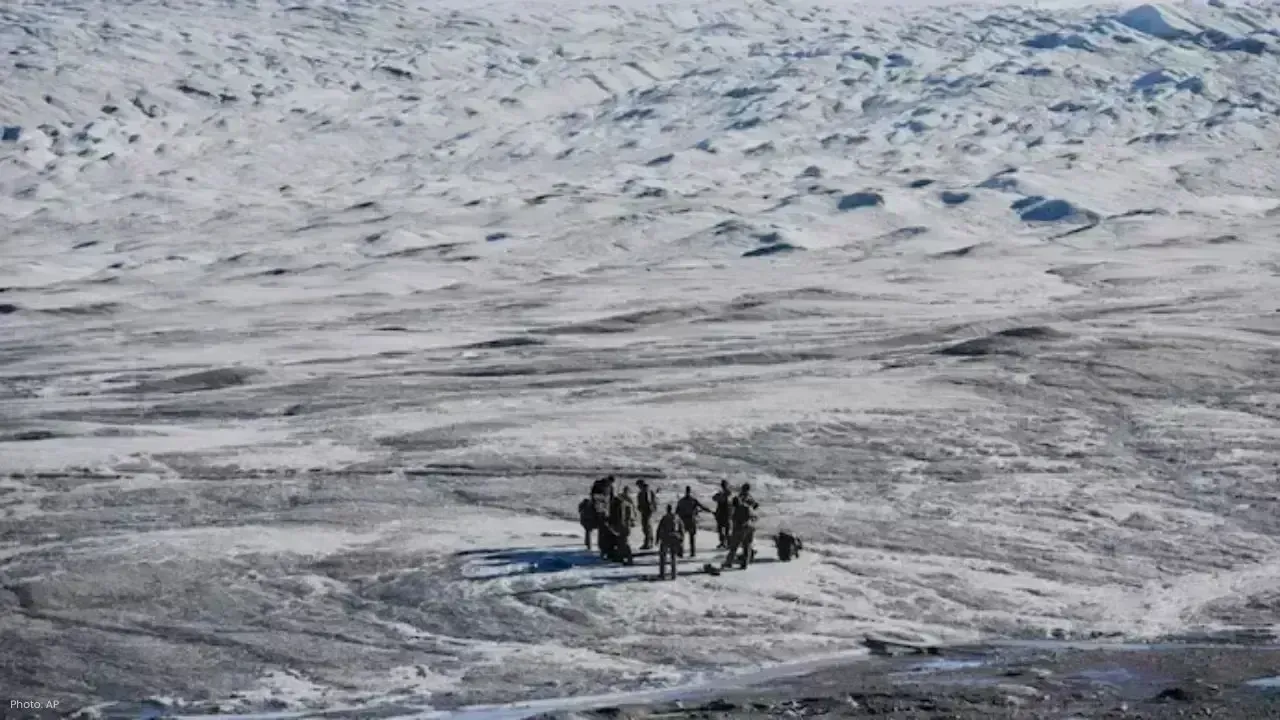You have not yet added any article to your bookmarks!

Join 10k+ people to get notified about new posts, news and tips.
Do not worry we don't spam!

Post by : Anis Farhan
The world’s oceans are experiencing unprecedented warming due to climate change, causing widespread disruption to marine ecosystems. As surface temperatures rise, delicate balances that have supported marine life for millennia are being destabilized. Scientists warn that continued warming will lead to further loss of biodiversity, affecting coral reefs, fish populations, and oceanic food webs. The consequences are not limited to the environment—millions of people who rely on oceans for food, livelihoods, and economic activity are also at risk.
Historically, ocean temperatures remained relatively stable, allowing marine species to adapt and thrive. Today, however, the combination of global warming, pollution, and overfishing has created a perfect storm for ecosystem degradation. Coral reefs, often called the rainforests of the sea, are especially vulnerable. When water temperatures exceed critical thresholds, corals expel their symbiotic algae, leading to bleaching events that can result in mass die-offs.
Ocean warming occurs as excess heat from greenhouse gas emissions is absorbed by the water. Oceans act as a buffer, absorbing more than 90 percent of the excess heat generated by climate change. While this helps slow global warming, it also disrupts marine environments.
Key effects of rising ocean temperatures include:
Altered Habitat Conditions: Many marine species are adapted to specific temperature ranges. Even slight warming can make their habitats inhospitable, forcing migration or resulting in population decline.
Coral Bleaching: Elevated temperatures stress corals, causing them to expel algae and lose coloration. Bleaching events have become more frequent and severe in recent decades.
Oxygen Reduction: Warmer waters hold less dissolved oxygen, affecting respiration in fish and invertebrates. This can reduce survival rates and impact reproductive success.
Changes in Food Webs: Temperature shifts affect plankton growth, which forms the base of the marine food chain. Disruptions here ripple through ecosystems, impacting fish, marine mammals, and seabirds.
Coral reefs are among the most sensitive ecosystems to temperature changes. They provide shelter, food, and breeding grounds for an estimated 25 percent of all marine species. Rising sea temperatures have triggered large-scale bleaching events, resulting in significant mortality of corals globally.
Repeated bleaching weakens coral resilience, reduces reproductive capacity, and makes reefs more susceptible to disease. As corals die, the structural complexity of the reef diminishes, reducing habitat availability for fish and invertebrates. Local communities dependent on reef fisheries and tourism face declining incomes and food security challenges.
Rising ocean temperatures are causing species to move toward cooler waters, often toward the poles or deeper ocean layers. This redistribution can lead to unexpected interactions between species, sometimes resulting in competition, predation, or even local extinction.
Fisheries are particularly affected. For instance, commercially valuable fish species such as tuna, cod, and sardines are migrating away from traditional fishing grounds, leaving coastal communities struggling to maintain catches. Scientists note that shifts in predator-prey relationships can destabilize entire ecosystems, further endangering biodiversity.
Marine biodiversity loss directly affects human populations. Fisheries provide protein for over three billion people globally. Declining fish stocks due to habitat loss, temperature changes, and overfishing threaten food security and economic stability.
Communities reliant on small-scale fisheries are most vulnerable. In regions like Southeast Asia, West Africa, and the Pacific Islands, fishing is a primary livelihood. Reduced catch rates lead to income loss, increased food prices, and heightened economic inequality. Industrial-scale fisheries are also impacted, as commercial fleets must follow migrating species to new territories, increasing operational costs and ecological risks.
Rising ocean temperatures are compounded by another consequence of climate change: acidification. Increased atmospheric carbon dioxide dissolves in seawater, lowering pH levels and affecting calcifying organisms like corals, mollusks, and some plankton species.
Acidification weakens shells and skeletons, reducing survival rates and impacting the food chain. Combined with warming, acidification creates multiple stressors for marine life, making adaptation increasingly difficult. Species facing both temperature stress and acidic waters are at higher risk of local extinction, altering ecosystem structure and function.
One of the most well-known examples of temperature-induced biodiversity loss is the Great Barrier Reef. Over the past two decades, the reef has experienced multiple mass bleaching events, leading to large-scale coral mortality. This has had cascading effects on reef fish populations, tourism revenue, and coastal protection.
The Arctic is warming at more than twice the global average rate. Melting sea ice and warming waters are driving rapid changes in marine habitats. Arctic species such as polar cod and ice-dependent seabirds are experiencing habitat loss, while invasive species from warmer waters are entering the region, further disrupting ecosystems.
In the Pacific Ocean, warming waters are linked to coral bleaching and declines in fish abundance. Small island nations are particularly vulnerable, as communities depend heavily on coral reef ecosystems for both food and income. Rising temperatures also exacerbate the intensity of storms, further stressing marine ecosystems.
The decline in marine biodiversity has far-reaching consequences:
Tourism Losses: Coral reefs and marine wildlife attract millions of tourists annually. Biodiversity loss reduces tourism income, affecting local economies.
Coastal Protection: Healthy reefs act as natural barriers, reducing the impact of waves and storms. Degraded ecosystems increase vulnerability to flooding and erosion.
Global Food Security: Fish and seafood contribute significantly to global nutrition. Declines in fish populations threaten dietary protein sources for millions.
Cultural Impacts: Marine ecosystems hold cultural and spiritual significance for many coastal communities. Biodiversity loss erodes cultural heritage linked to traditional fishing and marine practices.
Addressing the decline of marine biodiversity due to rising temperatures requires coordinated action:
Marine Protected Areas: Establishing no-fishing zones and marine reserves helps ecosystems recover and increases resilience to temperature fluctuations.
Sustainable Fisheries Management: Implementing catch limits, seasonal closures, and eco-certifications reduces overfishing and helps maintain ecological balance.
Climate Action: Reducing greenhouse gas emissions globally is critical to limit further warming of ocean waters. International agreements and national policies play a key role in climate mitigation.
Restoration Projects: Coral gardening, reef restoration, and habitat rehabilitation help revive damaged ecosystems.
Research and Monitoring: Continuous scientific monitoring of ocean temperatures, species distributions, and ecosystem health guides effective conservation strategies.
Global efforts to protect marine biodiversity depend on public awareness. Coastal communities, NGOs, and environmental organizations are key drivers of education and action. Initiatives include promoting sustainable seafood consumption, reducing marine pollution, and advocating for stronger climate policies.
Community-based conservation programs empower local populations to protect reefs, manage fisheries sustainably, and participate in restoration projects. Citizen science projects, such as reef monitoring, allow individuals to contribute to data collection and conservation efforts.
If ocean temperatures continue to rise, projections indicate severe biodiversity loss in coming decades. Coral reefs may decline by up to 90 percent under high-emission scenarios, and fish migration will further disrupt ecosystems and food security. Immediate action to reduce emissions, protect marine habitats, and implement adaptive management strategies is essential.
Scientific models suggest that even small reductions in global warming can significantly reduce risks to marine biodiversity. International collaboration, sustainable fisheries practices, and ecosystem restoration offer pathways to preserving ocean health for future generations.
Protecting the oceans is not only an environmental necessity but a societal imperative. The health of oceans directly impacts climate regulation, food security, economic stability, and human well-being. Failure to act could result in irreversible ecological damage and widespread socioeconomic consequences.
This article is for informational purposes only and is based on scientific research and observations as of 2025. It does not constitute professional advice. Readers are encouraged to consult experts for guidance on environmental policy, conservation, and climate adaptation strategies.










Rashami Desai Opens Up About 8-Year Battle With Depression
TV actress Rashami Desai reveals how work helped her heal from an eight-year-long struggle with depr

Myanmar Polls Proceed as Junta Chief Min Aung Hlaing Looms Large
Though not on the ballot, junta leader Min Aung Hlaing dominates Myanmar’s election amid civil war,

Greenland Annexation Bill Proposed to Strengthen US Arctic Control
A new US bill proposes Greenland's annexation and statehood to secure Arctic dominance and curb Chin

Canada’s PM Mark Carney Begins Key China Visit Amid Trade Tensions
Canada’s PM Mark Carney visits China to strengthen trade and security ties amid strained U.S. relati

FIFA Names Stats Perform as Exclusive Betting Data Partner for 2026 World Cup
FIFA grants Stats Perform exclusive rights to distribute official betting data and live streams for

Covid Vaccine Doubts Fade as Majority of Hesitant People Get Vaccinated
A major England study shows most people hesitant about Covid vaccines later got vaccinated, proving